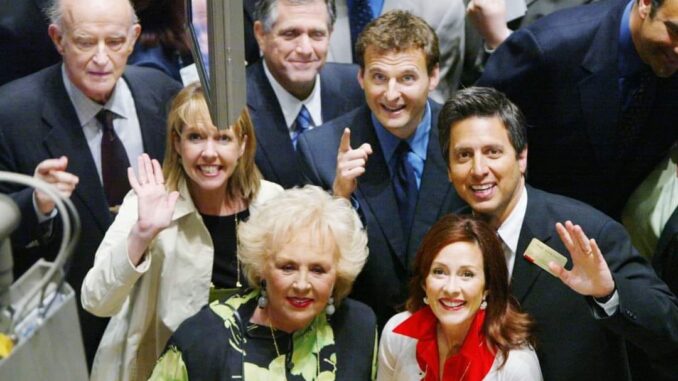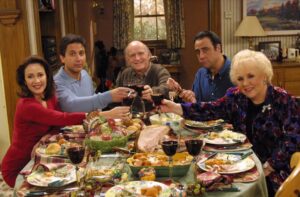
Welcome to a new Sitcom Tuesday! This week, we’re continuing our look at Everybody Loves Raymond (1996-2005, CBS), the best “family” sitcom from the turn of the century. Everybody Loves Raymond stars RAY ROMANO as Raymond Barone, PATRICIA HEATON as Debra Barone, BRAD GARRETT as Robert Barone, PETER BOYLE as Frank Barone, and DORIS ROBERTS as Marie Barone.

Although we’ve established that the weakest season of this entire series is its first, and we’ll eventually come to note that the last three years are imperfect because they follow an era that was more thesis-connected and effortlessly consistent, I nevertheless don’t think there’s any season of Everybody Loves Raymond that’s as disappointing as its third. Wait — don’t get me wrong, it’s so much better than the two preceding, development-needing years, but that’s precisely what’s disappointing about Three. Unlike the first two — which had growing pains to endure (Two had a lot because One was surprisingly negligent) — this is the first year that could have been a part of the series’ peak. That’s right. My little trimester framework that I’ve foisted upon you for this coverage might not have existed if Three was slightly better. Unfortunately, we’ll all have to make due with Three being peak-adjacent, meaning that even though it’s not quite at its best, it’s so very close to where we want it to be. And indeed, there’s a moment in the year — a specific, singular episode, near the end — where I think the show actually gets to the second trimester’s “being,” finally ready to fire on all cylinders for a whole season, which will be the series’ fourth — the first of the peak era, the first of the second trimester’s “being” phase, and one of the few near-perfect collections. So, what holds Three back? Well, quite frankly, Patricia Heaton’s pregnancy… Just as we saw to a lesser extent at the end of the first year, when character strides were undermined because Debra’s usage was qualified, Three suffers because it can’t write its leading lady the way it needs to in order to regularly fulfill its thesis. And that’s enough to handicap the whole year because a third of the season (at least) is forced to include her minimally, if at all — essentially reducing the year’s capabilities by 33%.

What makes this event — which is beyond the show’s control, by the way — particularly tragic is that Season Two had poised Three for greatness because it had already learned something vital about the series’ identity, specifically that it wasn’t about Ray; it was about Ray’s family — both sides (Debra being one of the sides) — of which he is the center. To wit, the 66% of Season Three where Debra is used decently is, for the most part, terrific — even better than the flashes of brilliance observed in Two. What’s more: it’s more suggestive of sustainable quality, for unlike its predecessor, which opened with a relatively weak offering that indicated just how little improvement the show was taking with it from Season One into Two, Three gives us a premiere entry — highlighted below — that communicates perfect self-understanding: Ray’s old family is intrusive upon his new family and this is the central conflict, because he’s naturally stuck in the middle (albeit, more often than not, and as in the case of “The Invasion,” he’s more on his new family’s side — Debra’s — because remember, the pilot set their bond as dominant, and this is structurally vital). From there, the show is better able to embed this into weekly plot, even if it’s not an episode’s main narrative, and this is exactly the kind of storytelling know-how that we’ll see on display in the second trimester… Now, if the comedy in the year’s early outings still feels tame in comparison to the upcoming peak era efforts, the entries following Heaton’s maternity leave — even the narratively mediocre ones — are tonally evolved: bolder and more recognizably bellicose. This is because something finally clicks with Debra — see more below (and next week) — as she starts to inhale the healthy fumes of a fully-realized central conflict that has her, like Marie, becoming an even more seminal figure — one that requires an elevated toughness. And with Debra trained for combat, the show is now ready to engage her…

Because, you see, Debra is also benefiting from what’s around her: stronger, more precise characterizations for the rest of the Barone clan… This speaks to the silver lining of Three’s “where’s Debra?” cloud, for although episodes that don’t use Heaton properly almost always fail to delight because they simply can’t address the show’s thesis — meaning that the exceptions, several of which are highlighted below, have an inherently uphill battle in the quest for greatness — they accordingly have to turn their sights elsewhere, giving more play to the other half of Ray’s family: his parents and his brother. As a result, our anchoring Barone finds his relationship with the others — and their relationships with each other —
